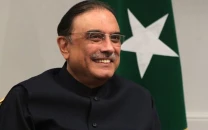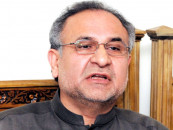Nuclear deterrence conference: Countries should commit to no-first-use policy
Speakers term Kashmir dispute central to diffusing tension between India, Pakistan.

Countries should commit to no-first-use policy. PHOTO: FILE
It would be ideal for world peace if countries with nuclear weapons commit mutually to a no-first-use policy and eventually get rid off their nuke arsenals over the next few decades.
Ground realities dictate Pakistan and India have a discussion on the nuclear tension in the subcontinent and that is not possible without addressing the Kashmir dispute. Experts expressed these views during the final sessions of the three-day “Nuclear Deterrence and Emerging Dynamics in South Asia” conference. The conference was organised by the South Asian Strategic Stability Institute (SASSI) University.
Lt Gen. (retd) Raza Muhammad Khan, a former National Defence University (NDU) president, said rationality, the main principle of deterrence, should be considered in the use of tactical weapons. Pakistan and India “cannot sustain the long-term costs of their nuclear weapons systems.”
Dr Vladimir Kozin, a Russian expert said it was his desire that all nuclear armed countries “announce mutual commitment to no first use.” The no-first-use policy states that a nuclear power will not use nuclear weapons against another country unless it is attacked first.
Kozin said nuclear states should also follow the US and Russia in nuclear reduction talks. As a final target, he said, all nuclear powers should work towards a final target date to destroy, dismantle and replace their nuclear weapons arsenals.
In his official capacity as the head of advisers to the director of the state-run Russian Institute of Strategic Studies, Kozin said no country including Russia and the US, have ever had any bilateral or multilateral talks on tactical nuclear weapons.
Talks by other speakers centered on tactical weapons and nuclear deterrence in the South Asian context. Dr Zafar Nawaz Jaspal, director of Quaid-i-Azam University’s School of Politics and International Relations, said arms control is between equal states. “India might call itself Pakistan’s equal but the world’s treatment of India belies this equality.” India has a bloodletting strategy, he added.
SASSI University Director General Maria Sultan said the rules of deterrence are the same for tactical and strategic weapons: the ability to penetrate the enemy’s defence, maintain survivability of own assets and enhancing capability to strike the enemy.
“Nuclear deterrence is only credible if you clearly communicate that this is our capability, this is our national resolve and this is how we will retaliate if we are attacked,” Sultan said, responding to a question on the credibility of deterrence measures.
Maiza Hameed, Pakistan Muslim League-Nawaz parliamentarian, said economic stability should also factor in a discussion about Pakistan’s nuclear programme. Economic stability is more important for Pakistan, so that the country is stronger economically to put its cards on the negotiation table, she added.
Zulfiqar Khan, head of NDU’s Strategic and Nuclear Studies department, said disarmament is not on the Indian agenda. India is energy- starved and needs to meet demand created by economic growth. It might look to cooperate with other regional countries and regional relations might evolve, he added.
Jaspal also said deterrence is not a stated concept. It evolves with time, he said. “The number of weapons understood by the term minimum deterrence level might vary.”
Published in The Express Tribune, May 16th, 2014.



1724319076-0/Untitled-design-(5)1724319076-0-208x130.webp)















COMMENTS
Comments are moderated and generally will be posted if they are on-topic and not abusive.
For more information, please see our Comments FAQ